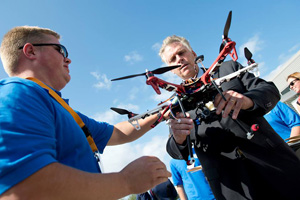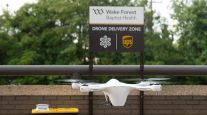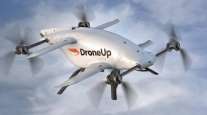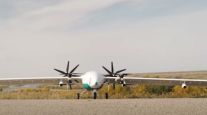Permits for Drones Soar Even as FAA Develops Rules

The Federal Aviation Administration is issuing permits for the commercial use of drones at a rate of about 250 a month as it tries to meet the growing demand for unmanned aircraft while it develops rules for their use.
Through the end of June, the agency had approved 714 permits, a 14-fold increase from 51 at the end of March, according to a database compiled by Bloomberg News using federal data. FAA says it won’t have permanent rules in place until next year but in April instituted an expedited approval process using temporary standards.
“We’ve got more people flying, which is great,” said Brian Wynne, president and CEO of the Association for Unmanned Vehicle Systems International in Arlington, Virginia. “We still continue to believe this is not the best way to regulate.”
Most exemptions grant permission to capture aerial images, either by still or video camera or by using more advanced equipment such as infrared sensors and scanners. Photography and videography was listed on 50% of requests, followed by 27% for inspections and 24% for mapping and surveying. Most applicants listed multiple potential uses.
FAA released in February proposed rules that would require drones be flown within sight of an operator and away from aircraft flight paths, among other conditions. The proposal bars flights to deliver goods to homes as envisioned by Amazon.com Inc., although FAA is working with the online company and others to develop technology necessary to permit deliveries.
FAA said it’s been able to speed issuing exemptions because in April it began granting near-automatic approval when a request is for a use that previously was authorized.
“Summary grants are far more efficient because they don’t need to repeat the analysis performed for the original exemption on which they are based,” FAA said in a statement.
Congress in 2012 ordered the agency to create a waiver program for safe drone use while permanent rules were being drafted. The first waivers were granted in September to six film-making companies.
The agency has set a higher safety bar for companies flying under waivers. It requires a pilot’s license, a restriction not included in the proposed regulations.
Transportation Secretary Anthony Foxx said the agency is learning how to integrate drones into the national airspace from the waivers it is issuing.
“While our proposed rule for small unmanned aircraft goes through analysis and approval, we’ve created a way for hundreds of these unmanned aircraft operations to occur under controlled conditions,” Foxx said in a statement released by his office.
Duke Energy Corp., which received authorization in late June, will use the unmanned vehicles to monitor distribution lines, coal piles, dams and other equipment. This makes inspections safer, cheaper and quicker, said Aleksander Vukojevic, a company technology development manager. “You’re trying to find new technology, new ways, new processes to doing things more efficiently,” he said.
Prior to the drone, he said Duke used helicopters for aerial inspections and workers on foot.
Liberty Mutual Insurance Co. won a swift FAA exemption in June and plans to start flying drones to survey roof damage after disasters, said Glenn Greenberg, a spokesman for the Boston-based company.
“Right now, we send inspectors, and when it’s safe to do so they get up on the roof themselves,” Greenberg said. “The ability to keep our inspectors off ladders, off roofs is paramount.”
Several other insurers, including State Farm Mutual Automobile Insurance Co. and Travelers Cos. Inc., have won exemptions to use drones for property inspections.
“We’ve had an idea that this type of technology would benefit inspections for six or seven years,” said Patrick Gee, senior vice president of claims for Travelers.
Real estate agents and farmers also are getting exemptions.
Although the exemption is needed for commercial flights, many individuals are flying drones for hire without government permission at lower rates. That irks operators who followed the rules.
“It puts me at a competitive disadvantage,” said Bryan Cherry, a UPS pilot who started a drone-flying service after winning an FAA exemption.
Jay Puckett received permission to fly a drone, which he said he will use as part of Dronebois, a photo and video business he started with a friend in Oklahoma City. “I’m just trying to figure out the best use of the exemption,” he said.
Puckett said he plans to keep Dronebois after he enters the University of California at Berkeley to study engineering and work as an intern at two California-based drone companies.
“I’m trying to get my foot in the door with a company that already has feet on the ground while I have this exemption,” said Puckett, who in July was a couple of weeks away from earning his pilot’s license.




